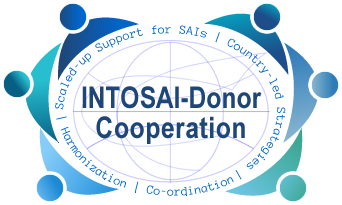Research on SAIs
Review of Coordination of Support to Supreme Audit Institutions 2017
This review identifies a range of “good practice principles” as well as “challenges” that have been experienced in coordination support to SAIs. The good principles and recommended measures to overcome challenges are presented to facilitate and influence positive behavior change. The report is based on evidence of examples and two case studies.
Enhancing coordination of support to SAIs, contributing to support being better aligned with country-led reforms and ultimately leading to better performing SAIs in developing countries – IDC 2009 MoU
Have a look at the review here!
Mira la reseña en español acá.
The review in French here.
The review in Arabic here.
Background
The Secretariat of the INTOSAI-Donor Cooperation acts as a knowledge centre and repository to enhance coordination of support to SAIs, providing information to and connecting donors and SAIs.
In the past years, the number of research papers on the role and importance of SAIs has significantly increased. Topics include SAIs’ role in national governance and political economy, preventing corruption, working with civil society, and Sustainable Development Goals.
Many researchers focus on approaches to SAI capacity development and the factors which support or hinder SAI development. Most papers combine theoretical and personal perspectives with case studies of specific countries and regions. However, there is a lack of a commonly agreed evidence base on both the value and benefits of SAIs and the factors that determine their strength and successful development, which could inform the future policies of the INTOSAI and donor communities.
In its 2013-2015 Program Document, the INTOSAI-Donor Cooperation therefore agreed on research and evidence on SAIs as one of the seven themes of the Cooperation, covering different aspects of research and generation of evidence relevant to SAIs in developing countries.Audit of Extractive Industries
The first analysis under this theme was a study on Audit of Extractive Industries. The study was based on a mapping of experiences, best practices, challenges and needs of SAIs in auditing Extractive Industries. The analysis showed a need for a capacity development program tailored to SAI needs, and general knowledge sharing of SAIs and other stakeholders. The report recommended the establishment of an institutional anchor within INTOSAI to take forward these, and possibly other, approaches.
Based on the report, the INTOSAI Knowledge Sharing Committee suggested the establishment of a Working Group on Extractive Industries Audit to the INTOSAI Governing Board. The 64th INTOSAI Governing Board agreed on SAI Uganda as chair of the Working Group.
The full report “Audit of Extractive Industries” is available here, in English.
Other research topics
- Citizen engagement and SAIs: The OECD and SAIs of Brazil and Chile conducted a stock-take. This analysis is one of the work-streams of the Effective Institutions Platform. For more information, please visit: http://www.effectiveinstitutions.org/media/Policy_brief_Supreme_Audit_Institutions_and_Citizen_Engagement.pdf
- SAI funding levels: Based on the results of the 2013 IDI Global Survey, initial data on the funding available to SAIs was analyzed here.
The Cooperation decided in 2012 to issue calls for research proposals.
Supreme Audit Institutions and good governance: Oversight, insight and foresight. OECD Public Governance Reviews http://www.oecd.org/gov/ethics/supreme-audit-institutions-and-good-governance.htm - PEFA 2016 – What it means for SAIs
- How National Audit Offices Can Support Implementation of the SDGs article about the role international donors and supreme audit institutions could play in strengthening transparency and accountability for the United Nations’ Sustainable Development Goals by Gijs de Vries http://blog-pfm.imf.org/pfmblog/2016/06/national-audit-offices-should-support-implementation-of-the-sdgs.html
To stimulate analysis and generation of evidence relevant to SAIs in developing countries, the Cooperation is currently considering establishing mechanisms for identifying, funding and disseminating research on SAIs. This could include awarding and managing research grants, and arranging events at which researchers could present their work on SAIs.
Further research on SAI Capacity Development (external links)
- Gustavsson, Maria (2013): Auditing the African State (PDF).
- Noussi, Katharina (2012): How Public Accountability Is Institutionalized: The Case of External Public Auditing in Global Perspective Applying a Mixed-Methods Approach.
- GIZ/INTOSAI (2013): Supreme Audit Institutions. Accountability for Development.
This reader includes articles from the INTOSAI General Secretariat, the IDI, donors and implementing agencies, and NGOs.
For more information, please contact the INTOSAI-Donor Secretariat at INTOSAI.donor.secretariat@idi.no
